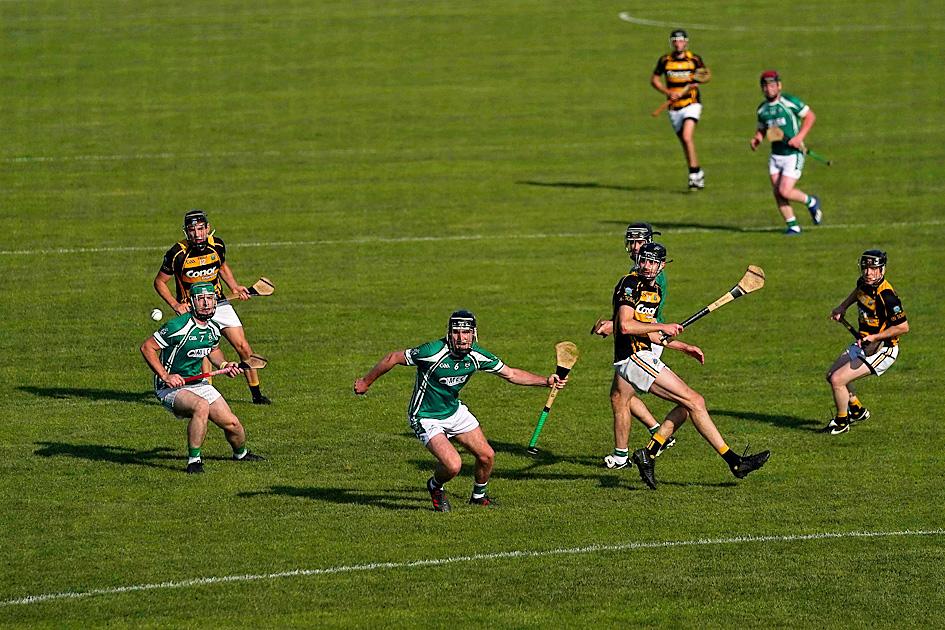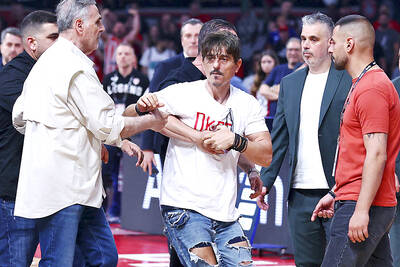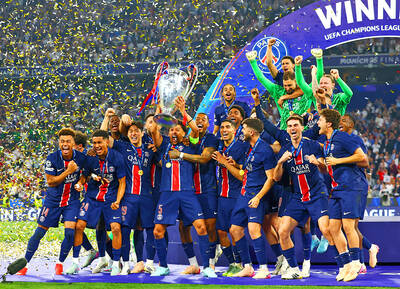In the summer of 1924, Ireland did something extraordinary: It hosted the biggest sporting event in the world that year — bigger, even, than the Paris Olympics.
Thousands of competitors and tens of thousands of spectators packed venues around Dublin for an array of events encompassing not only athletics, swimming, horse racing, archery and other sports, but also poetry, painting, dancing and sculpture.
The inaugural Tailteann Games — named after an ancient version of the Games last held seven centuries earlier — were designed to celebrate Irish culture and sporting prowess, but with a modern, global twist.

Photo: Reuters
Chess was included in the mistaken belief that the Irish invented it — the 32 pieces supposedly represented Ireland’s 32 counties — while sports deemed English, such as soccer, rugby and cricket, were excluded.
Elite foreign athletes were invited, including the US Olympic champion — and future star of Tarzan films — Johnny Weissmuller. Ireland had no proper swimming pool so he swam, and won, in a repurposed pond at Dublin Zoo.
This summer marks a centenary of sorts, because the inaugural Games were originally slated for 1922 and preparations were well advanced, while an arts exhibition went ahead.
Next week marks the 90th anniversary of the 1932 — and final — Tailteann Games.
Ireland is in the midst of commemorating historical events in a “decade of centenaries” spanning 1912 to 1923, a transformative decade when Ireland emerged as an independent state.
However, the Tailteann Games are not being commemorated.
“It has essentially slipped from the public consciousness. It has been lost to history,” said Paul Rouse, a history professor at University College Dublin who worked on a 2006 TG4 documentary about the Games.
“Over time, it’s been lost in the public memory, even though there are lots of houses with Tailteann medals and picture scrap books,” he said.
Rouse and a handful of academics who have written about the Games — held in 1924, 1928 and 1932 — say they were a hugely ambitious undertaking by a fledgling state to showcase Ireland as a viable nation.
“They took the germ of an idea that came from ancient Irish civilization, linked it to a cultural revival, repackaged that dream in an Olympic context and delivered it — and that’s important,” said Mike Cronin, academic director of Boston College Ireland.
The logistical feat of staging the inaugural Games was all the more impressive given that it came on the heels of the 1922-23 Irish Civil War and the 1919-21 Irish War Of Independence from Britain, with parts of Dublin still in ruins, Cronin said.
“It’s easy to dismiss it as a curio, but it was really significant. If they’d got it wrong — problems with the airport, trams, hotels, stadiums — it would have backfired. The fact they did it and made it work is testament to their grit and determination,” he said.
According to nationalist legend, the Irish High King Lugh held the original Tailteann Games, or Aonach Tailteann, in 632 BC to honor his stepmother, Queen Tailte, and they continued intermittently for more than 1,000 years until the Norman invasion of 1169 paved the way for English colonization.
Some nationalists even claimed they were the inspiration for the ancient Greek Olympics, although those Games started earlier.
The revival of hurling and other traditional Irish sports under the Gaelic Athletic Association and the creation of the Irish Free State in 1921 prompted Ireland’s new, fragile government to revive the Tailteann Games in 1922.
Civil war postponed the event until 1924, allowing organizers to schedule it just after the Paris Olympics and entice top international athletes, especially Americans who sailed home via Cobh. The New York Times, Pathe News and other outlets covered the spectacle.
The opening pageant at Croke Park featured an actress in a long dress and cloak as Queen Tailte and men dressed as Gaelic warriors with spears and wolfhounds.
The male-dominated Games were open to Irish citizens and members of the diaspora, with teams from Britain, the US, Canada, Australia and South Africa.
Organizers diluted Irishness in return for celebrity stardust in the form of Weissmuller, the US high jumper Harold Osborn and other Olympic champions.
Huge crowds watched car, motorcycle and aircraft races, the latter featuring the newly formed Free State Air Corps. There was also rowing, boxing and golf. Cultural events included ceilidhs, plays and speeches by the poet WB Yeats and other intellectuals. More than 1,000 medals were awarded.
“It was designed to demonstrate to the world that the Irish had survived centuries of colonization, that its civilization was intact, and that the Irish had taken their place among the nations of the Earth,” Rouse said.
Attendance and enthusiasm dipped in the 1928 Games, held just after the Amsterdam Olympics, and even more so in the 1932 Games, which could not siphon talent from the Los Angeles Olympics.

The Greek basketball league finals between Panathinaikos and Olympiakos were suspended by the government on Monday following on-court scuffles involving rival security teams. The best-of-five series is at 1-1. The third game, scheduled for today, has been postponed. The owners of both clubs were summoned to meet with the country’s sports minister. They “will be asked to provide explicit guarantees that this situation will be brought to an end. If not, this year’s championship will be definitively canceled,” government spokesman Pavlos Marinakis said. “There can be no tolerance for such pathological phenomena of violence and delinquency.” In online posts, the owners of Panathinaikos and

‘DREAM’: The 5-0 victory was PSG’s first Champions League title, and the biggest final win by any team in the 70-year history of the top-flight European competition Paris Saint-Germain won the Champions League for the first time as Luis Enrique’s brilliant young side outclassed Inter on Saturday in the most one-sided final ever with teenager Desire Doue scoring twice in an astonishing 5-0 victory. Doue supplied the pass for Achraf Hakimi to give PSG an early lead and the 19-year-old went from provider to finisher as his deflected shot doubled the advantage in the 20th minute. Doue scored again just after the hour mark, ending any doubt about the outcome before Khvicha Kvaratskhelia ran away to get the fourth and substitute Senny Mayulu, another teenager, made it five. Inter were

Ryan Yarbrough picked up a dazzling World Series ring from his time with the Los Angeles Dodgers last season. Then he went out and beat them. The New York Yankees starter on Sunday pitched one-run ball over six innings, struck out a season-high five and blanked the Dodgers’ top four hitters in a 7-3 win. “I feel like I’m in a really good place right now and really trying to continue that,” Yarbrough said. “I’m having a lot of fun.” The 33-year-old left-hander made 44 relief appearances between the Dodgers and Blue Jays last season. The Dodgers designated him for assignment on July

The Crusaders yesterday produced a clinical performance in difficult conditions to beat the Queensland Reds 32-12 and claim home advantage in next week’s Super Rugby semi-finals. Lock Scott Barrett and prop Tamaiti Williams scored first-half tries to reward an outstanding performance from the Crusaders’ forwards in wet, slippery conditions and bitterly cold temperatures. Scrumhalf Noah Hotham defied the conditions in the second half to score a superb solo try and, after kicking a conversion and penalty to make the score 22-0 at the hour mark, flyhalf Rivez Reihana scored a try which took the game beyond the Reds. “Typical Christchurch weather, cold, wet